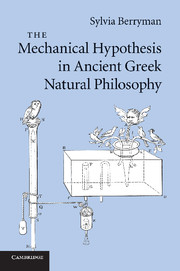Book contents
- Frontmatter
- Contents
- List of illustrations
- Acknowledgements
- Introduction
- 1 Mechanics and the mechanical: some problems of terminology
- 2 ‘Mechanistic’ thought before mechanics?
- 3 Mechanics in the fourth century
- 4 The theory and practice of ancient Greek mechanics
- 5 Ancient Greek mechanics continued: the case of pneumatics
- 6 The philosophical reception of mechanics in antiquity
- Conclusion
- Appendix: Ancient mechanics and the mechanical in the seventeenth century
- Bibliography
- Index of passages
- General index
Appendix: Ancient mechanics and the mechanical in the seventeenth century
Published online by Cambridge University Press: 24 December 2009
- Frontmatter
- Contents
- List of illustrations
- Acknowledgements
- Introduction
- 1 Mechanics and the mechanical: some problems of terminology
- 2 ‘Mechanistic’ thought before mechanics?
- 3 Mechanics in the fourth century
- 4 The theory and practice of ancient Greek mechanics
- 5 Ancient Greek mechanics continued: the case of pneumatics
- 6 The philosophical reception of mechanics in antiquity
- Conclusion
- Appendix: Ancient mechanics and the mechanical in the seventeenth century
- Bibliography
- Index of passages
- General index
Summary
It is only in the seventeenth century that the term ‘mechanical’ came into common use to describe a way of doing natural philosophy. This appendix draws on the results of recent scholarly work on this period in disentangling different threads in the complex history of the term ‘mechanical’. There are several reasons for attempting to trace the reception of the ancient Greek tradition of mechanics in the seventeenth century. One is to show why twentieth-century usage, based as it is on an opposition that was formulated in the early modern period, is so multifaceted. A second is to justify my rejection of a scholarly commonplace that a view of mechanics Galileo rejects goes back to antiquity. The third is to indicate that the sense in which I have been writing of a ‘mechanical hypothesis’ in late antiquity is similar to the sense in which that phrase came to be used in the seventeenth century. Comparisons between the ancient and modern reception of mechanics are most often made by experts in the latter period; I hope it does not seem unduly hubristic to trace that reception from a different perspective. This is not of course intended as a complete account of the meanings of ‘mechanical’ in the seventeenth century but rather focuses on the reception of ‘mechanics’ in the ancient Greek sense. Because modern categories are shaped by seventeenth-century usage, attention to the shaping of those categories is a task that scholars of ancient Greek thought cannot avoid.
- Type
- Chapter
- Information
- The Mechanical Hypothesis in Ancient Greek Natural Philosophy , pp. 236 - 249Publisher: Cambridge University PressPrint publication year: 2009



